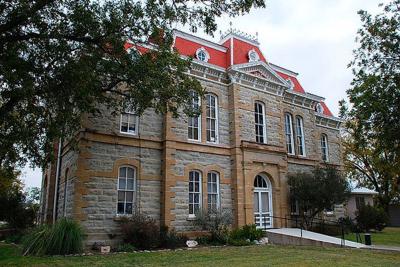Eden City Hall
120 Paint Rock Street
Eden, Texas 76837
(325) 869-2211
About Concho County
Population: 4,087 (2010 Census)
History
Concho County, the northwestern-most county within the Central Texas Hills & Rivers Region, gets its name from the Concho River that flows through it. The river’s name, Spanish for “shell,” was derived from early Spanish explorers who traversed the area during the 17th century, finding large quantities of shells in its waters.
For thousands of years the county was inhabited by nomadic Indians, who found the Concho River to be an important food source. It was also on the banks of the Concho River that shamanistic ritual training was performed by Comanche Indian tribes. Approximately 1,500 pictographs were painted on limestone bluffs that overlook the Concho River.
In 1882 Comanche Indians were still active and raiding settlers in Concho County. Frederick Ede, of English descent, however, platted the town of Eden encouraging more settlers to establish in the area. Families from the East coast, Midwest and throughout Europe came to Concho County during the 19th century, drawn by the romance of the undiscovered American west and the lure of land. Agriculture and livestock reigned, with Concho County being the largest sheep and wool producing county in the United States up until 1988.
Geography
The county straddles the northern edge of the Edwards Plateau and features two major rivers: the Concho River and Colorado River, which forms the northeast county line. Concho County’s elevation ranges from 1,600 feet to 2,100 feet above sea level.
Cities in Concho County
Paint Rock (pop. 273 - 2010 census) is the county seat (US Highway 83) and located approximately 30 miles east of San Angelo and 150 miles northwest of Austin. Some of the most noted Indian pictographs in the state are found at Paint Rock Excursions. Visitors can see approximately 1,500 markings by Comanche Indians and other nomadic groups who originally occupied the area. Other activities in Paint Rock include Ingrid’s Custom Hand-Woven, Inc., where 100% sheep’s wool rugs and saddle blankets are made.
Eden (pop. 1,680 - 2010 census) is 17 miles east of the geodetic center of the state. It is home to the Don Freeman Memorial Museum, which details a time line of the county’s development, from early Native American settlements through the present; a large portion of the museum is devoted to Eden’s military heroes, highlighting General Ira C. Eaker, inventor of the 'artificial horizon'.
Other Concho County communities are Millersview in the east, Eola in the west, and Lowake (the smallest) is located in the northwest.
Festivals and Events in Concho County
April:
Spring Stampede, Eden
June:
Summer Solstice at Paint Rock Excursions
July:
July 4th Fireworks, Paint Rock
September:
Annual Fall Fest Celebration and World Class Bull Ride, Eden
November:
Concho County Hunters' Appreciation Lunch, Paint Rock (First Saturday of November)
Camouflage Cotillion, Eden
December:
Christmas on the Square, Eden
Winter Solstice at Paint Rock Excursions

